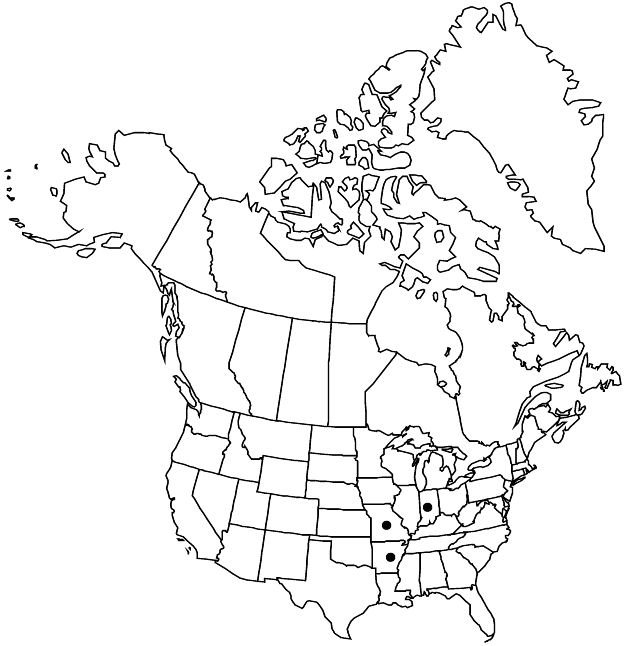Difference between revisions of "Crataegus ×incaedua"
Trees & Shrubs 2: 3, plate 102. 1907. as species
FNA>Volume Importer |
GeoffLevin (talk | contribs) m (Corrected authority to match printed version) |
||
| (7 intermediate revisions by 2 users not shown) | |||
| Line 1: | Line 1: | ||
{{Treatment/ID | {{Treatment/ID | ||
|accepted_name=Crataegus ×incaedua | |accepted_name=Crataegus ×incaedua | ||
| − | |accepted_authority= | + | |accepted_authority=Sargent |
|publications={{Treatment/Publication | |publications={{Treatment/Publication | ||
|title=Trees & Shrubs | |title=Trees & Shrubs | ||
|place=2: 3, plate 102. 1907 | |place=2: 3, plate 102. 1907 | ||
|year=1907 | |year=1907 | ||
| + | |other_info_on_pub=as species | ||
}} | }} | ||
|special_status={{Treatment/ID/Special_status | |special_status={{Treatment/ID/Special_status | ||
| Line 27: | Line 28: | ||
|elevation=150–200 m | |elevation=150–200 m | ||
|distribution=Ark.;Ind.;Mo. | |distribution=Ark.;Ind.;Mo. | ||
| − | |discussion=<p>Crataegus ×incaedua is similar to C. collina var. sordida except for the cream anthers and two or three styles and pyrenes; it probably is a hybrid of C. collina with C. calpodendron, according to E. J. Palmer (1952).</p> | + | |discussion=<p><i>Crataegus ×incaedua</i> is similar to <i>C. collina </i>var.<i> sordida</i> except for the cream anthers and two or three styles and pyrenes; it probably is a hybrid of <i>C. collina</i> with <i>C. calpodendron</i>, according to E. J. Palmer (1952).</p> |
|tables= | |tables= | ||
|references= | |references= | ||
| Line 36: | Line 37: | ||
-->{{#Taxon: | -->{{#Taxon: | ||
name=Crataegus ×incaedua | name=Crataegus ×incaedua | ||
| − | + | |authority=Sargent | |
| − | |authority= | ||
|rank=species | |rank=species | ||
|parent rank=genus | |parent rank=genus | ||
| Line 51: | Line 51: | ||
|publication year=1907 | |publication year=1907 | ||
|special status=Endemic | |special status=Endemic | ||
| − | |source xml=https:// | + | |source xml=https://bitbucket.org/aafc-mbb/fna-data-curation/src/2e0870ddd59836b60bcf96646a41e87ea5a5943a/coarse_grained_fna_xml/V9/V9_1098.xml |
|subfamily=Rosaceae subfam. Amygdaloideae | |subfamily=Rosaceae subfam. Amygdaloideae | ||
|tribe=Rosaceae tribe Gillenieae | |tribe=Rosaceae tribe Gillenieae | ||
Latest revision as of 14:44, 30 November 2021
Shrubs or trees, 50–70 dm. Stems: twigs: new growth pubescent, 1-year old light gray-brown, older grayish; thorns on twigs numerous, 1-year old bright chestnut brown, slender, 4–7 cm. Leaves: petiole length 20% blade, villous early, glabrescent; blade narrowly obovate, 5–6 cm, base narrowly cuneate, lobes 0, margins serrulate, venation camptodromous, veins 4–6 per side, apex acute, abaxial surface veins villous, adaxial soft-white-hairy young, glabrescent. Inflorescences 12–20-flowered; branches puberulent; bracteoles ± persistent, numerous, very narrow, membranous, margins glandular. Flowers 14–15 mm diam.; hypanthium densely villous; sepals narrowly triangular, margins glandular-serrate; stamens 10–15, anthers cream; styles 2 or 3. Pomes yellowish red, suborbicular, 9–10 mm diam., punctate, glabrous; sepals narrow, ± reflexed; pyrenes 2, dorsally grooved, sides plane.
Phenology: Flowering May; fruiting Sep–Oct.
Habitat: Gravelly stream beds
Elevation: 150–200 m
Distribution

Ark., Ind., Mo.
Discussion
Crataegus ×incaedua is similar to C. collina var. sordida except for the cream anthers and two or three styles and pyrenes; it probably is a hybrid of C. collina with C. calpodendron, according to E. J. Palmer (1952).
Selected References
None.